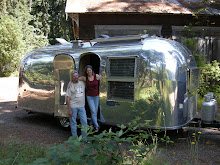
The first thing you notice when you pull into Organic Valley’s (www.organicvalley.com) headquarters in La Farge, WI is the large array of solar panels that dominate the front of the building. Recently installed and built with the help of students from the Midwest Renewable Energy Association (MREA) the panels are just part of their efforts to reduce the carbon footprint of their operations. The power from this impressive array is pumped directly into the grid, thereby reducing their dependence on power generated by the power company with fossil or other fuels. Immediately inside the front lobby sits a computer station that monitors every aspect of the array’s performance. Anyone can see at a glance how much power it is generating at the moment, for the day, month year, and how much CO2 that would otherwise have been generated it has reduced. Way cooler than my little control panel in the Airstream!
We had arranged a tour with Jennifer Harrison, the Sustainability Program Manager for Organic Valley. If you are not familiar with the company, they are the largest Co-Op of Organic Farmers and Dairies in the U.S. Their products such as milk, cheese, butter, eggs, juice and produce are available in many groceries throughout the country.
Jennifer greeted us in the lobby and gave us an excellent tour of the facility that began with the solar panels and the fields of Camelina and Sunflowers that grew nearby and from which they produce bio-diesel for their vehicles. They not only generate fuel for themselves, they also have a “mobile” bio-diesel distillery which they are using for a pilot program to help teach their Co-Op members how to produce bio-diesel on their farms from the waste they generate. We did not get to see the distillery in action as it was out in the field doing its work! This program has been very successful so far and it has inspired a number of their members to begin their own programs. This has the duel effect of reducing their waste and their dependence on fossil fuels.
Unlike many companies that prefer to use carbon offsets to reduce their impact, both the Solar Panels and the bio-diesel distillery are part of Organic Valley’s commitment to develop and use programs that make a real measurable difference. These programs include a van-pool for employees living in outlying areas, free bicycles for the use of the employees, and a community garden.
We then toured their building which was built in 2004 to LEED Silver standards. We did not get to meet George Siemon, one of the original founders of Organic Valley and now the self-styled “C-E-I-E-I-O” as he was out, but we did see his unassuming office which included reclaimed barn wood floors, and a view of the community garden that he has been known to wander out and weed the less diligent members plots to improve his view.
After meeting some of the other members of the staff, we were treated to lunch in the company’s cafeteria, where Organic Valley products such as milk, cheese and juice are available at no charge to the employees. Lunch itself is very inexpensive and based on weight. The more you eat the more you pay!
We continued to chat with Jennifer while we ate and covered a wide range of subjects including their efforts to reduce or capture the methane produced on their farms, ongoing social responsibility programs, and one of my biggest concerns, Genetically Modified Organisms or GMOs (Wikipedia-GMOs). GMOs are genetically engineered crops which now constitute up to 90% of certain crops like corn and soy grown in the U.S. The use of these monster seeds is very controversial, and many believe that it is not only potentially disastrous, but may also be linked to some strange goings on like the sudden collapse of bee colonies around the world (Wikipedia-Colony Collapse Disorder). Jennifer indicated that they were very concerned about these issues, and were actively involved in efforts to regulate their use and developing a “seed bank” to prevent the loss of certain strains and species of plants. Many plant species are already under pressure and hundreds of them are already lost. Most of the GMO seeds come from the supplier already infused with pesticides and are sterile so that the farmer is forced to buy new seeds each year. Many fear that these sterile plants will unleash an Armageddon in the plant world that will leave us with plants unable to propagate themselves. Should something then go wrong with the supply of GMOs, or further research proves that they are indeed as harmful as it is feared; we may find ourselves unable to replace them with the plants that our ancestors ate (Article-GMOs Threaten Food Supply)
While we were eating, an email was circulated inviting the employees to come visit the Airstream, and we were delighted to show it to a number of them after lunch. We hung for awhile then bid Jennifer adieu and drove off through the verdant farmland of SW Wisconsin.




No comments:
Post a Comment